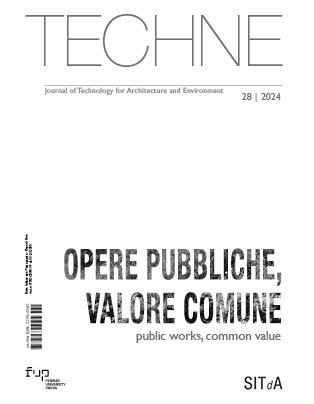Published 2024-10-29
Keywords
- Urban Regeneration,
- Design-Driven Innovation,
- Service Design,
- Health and Human Care,
- Sports
How to Cite
Copyright (c) 2024 Stefano Follesa, Martina Corti, Diletta Struzziero, Aurora Piluso

This work is licensed under a Creative Commons Attribution 4.0 International License.
Abstract
This paper aims to investigate the connections between sports and Urban Regeneration, and the role these connections can have in the communities of the cities. The promotion of physical activity within urban areas is today a driving force for economic and social development, and intervenes in the fragile conditions of cities. Design, as a discipline of connection between the active components of these transformations, becomes an instrument of inclusion. The interaction between people and urban space is central in promoting physical activity and a diversified community commitment. The paper investigates practices and tools of the discipline in the relationship between urban spaces and sports practices, and how this relationship leads communities to conceive new development opportunities.
Downloads
References
- Armato, F. (2017), “Pocket park: product urban design”, The Design Journal, Vol. 20, n.1, S1869-S18-78. Available at: https://doi.org/10.1080/14606925.2017.1352705. DOI: https://doi.org/10.1080/14606925.2017.1352705
- Caspersen O.H., Konijnendijk C.C. and Olafsson, A.S. (2006), “Pianificazione degli spazi verdi e uso del territorio: An Assessment of Urban Regional and Green Structure Planning in Greater Copenhagen”, Geografisk Tidsskrift-Danish Journal of Geography, Vol. 106, n.2, pp. 7-20. Available at: https://doi.org/10.1080/00167223.2006.10649553. DOI: https://doi.org/10.1080/00167223.2006.10649553
- Cohen-Shacham, E., Walters, G., Janzen, C. and Maginnis, S. (2016), “Nature-Based Solutions to Address Global Societal Challenges”, IUCN: Gland, Switzerland, Vol. 97, pp. 2016-2036. Available at: https://doi.org/10.2305/IUCN.CH.2016.13.en. DOI: https://doi.org/10.2305/IUCN.CH.2016.13.en
- Dadvand, P. and Nieuwenhuijsen, M. (2019), “Green space and health”, Integrating human health into urban and transport planning: A framework, pp. 409-423. Available at: https://doi.org/10.1007/978-3-319-74983-9. DOI: https://doi.org/10.1007/978-3-319-74983-9_20
- Dunn, H. L. (1959), “What high-level wellness means”, Canadian Journal of Public Health/Revue Canadienne de Sante’e Publique, Vol 50, n.11, pp. 447-457.
- Faroldi, E. and Battaglia, S. (2022), “Sport è città. L’architettura e l’infrastruttura sportiva quali motori di rigenerazione urbana”, Sport e spazi umani: dalla forma all’evento, Tuga Edizioni, pp. 27-40.
- Galea, S. and Vlahov, D. (2005), “Urban health: evidence, challenges, and directions”, Annu. Rev. Public Health, Vol. 26, pp. 341-365. Available at: https://doi.org/10.1146/annurev.publhealth.26.021304.144708. DOI: https://doi.org/10.1146/annurev.publhealth.26.021304.144708
- Konijnendijk, C.C. (2023), “Evidence-based guidelines for greener, healthier, more resilient neighborhoods: Introducing the 3–30–300 rule”. J For Res, Vol. 34, pp. 821-830. Available at: https://doi.org/10.1007/s11676-022-01523-z. DOI: https://doi.org/10.1007/s11676-022-01523-z
- McCullough, B.P. and Cunningham, G.B. (2012), “A Conceptual Model to Understand the Impetus to Engage in and the Expected Organiza-tional Outcomes of Green Initiatives”. Quest, Vol. 62, n. 4, pp. 348-363. Available at: https://doi.org/10.1080/00336297.2010.10483654. DOI: https://doi.org/10.1080/00336297.2010.10483654
- McDonald, R. I., Aronson, M. F., Beatley, T., Beller, E., Bazo, M., Grossinger, R. and Spotswood, E. (2023), “Denser and greener cities: Green interventions to achieve both urban density and nature”, People and Nature, Vol. 5, n. 1, pp. 84-102. Available at: https://doi.org/10.1002/pan3.10423. DOI: https://doi.org/10.1002/pan3.10423
- Mees, C. (2017), “The Emergence of Community Gardens in New York with Focus on the South Bronx”, Participatory Design and Self-building in Shared Urban Open Spaces, pp. 75-111. Available at: https://doi.org/10.1007/978-3-319-75514-4_4. DOI: https://doi.org/10.1007/978-3-319-75514-4_4
- Mondini, G. (2019), “Valutazioni di sostenibilità: dal rapporto Brundtland ai Sustainable Development Goal”, Valori e Valutazioni, Vol. 23. Available at: https://siev.org/wp-content/uploads/2020/02/23_15-_-MONDINI.pdf (Accessed on 15/01/2024).
- Montipò, C. (2015), “Le politiche di pocket parks come strumenti di rigenerazione della città pubblica”, Urbanistica Tre. Available at: https://iris.polito.it/handle/11583/2689955 (Accessed on 04/01/2024).
- Next City (2022), Next City: the future of monumentally.
- Pedersen Zari, M. (2020), “Biomimetic Urban and Architectural Design: Illustrating and Leveraging Relationships between Ecosystem Services”. Biomimetics, Vol. 6.1, n. 2. Available at: https://doi.org/10.3390/biomimetics6010002. DOI: https://doi.org/10.3390/biomimetics6010002
- Pye, P. N., Toohey, K. and Cuskelly, G. (2015), “The social benefits in sport city planning: a conceptual framework”. Sport in Society, Vol. 18, n. 10, pp. 1199-1221. Available at: https://doi.org/10.1080/17430437.2015.1024235. DOI: https://doi.org/10.1080/17430437.2015.1024235
- Rifkin, J. (2011), La terza rivoluzione industriale, Edizioni Mondadori, Milano.
- Roberts, P. (2008), “The evolution, definition and purpose of urban regeneration”, Urban Regeneration: A handbook, SAGE Publications Ltd, London, pp. 9-36. Available at: http://dx.doi.org/10.4135/9781446219980. DOI: https://doi.org/10.4135/9781446219980.n2
- Russo, G. and Della Sala, V. (2023), “Sport e ambiente: verso un modello culturale di sostenibilità”, Journal of Research and Didactics of History, Vol. 5, n. 1S, pp. 35–50. Available at: https://doi.org/10.6092/issn.2704-8217/18420.
- Russo, G. and Ferri, G. (2015), “Corpi sportivi e pratiche di benessere: Il caso degli Urban Game a Bologna”, La Ricerca Folklorica, Vol. 70, pp. 103-112. Available at: https://www.jstor.org/stable/26491137 (Accessed on 28/12/2023).
- Sangalli, A. (2021), Il kilometro verde. Progetto per un nuovo parco agri-sportivo a Treviglio per il benessere e l’inclusione sociale. Available at: https://www.politesi.polimi.it/handle/10589/175072 (Accessed on 06/01/2024).
- Spinelli, G. (2010), “Prefazione”, in Simon, C. (Ed.) (2010), Piccoli spazi urbani: indicazioni per aree gioco di qualità, Maggioli Editore, Santarcangelo di Romagna.
- Smith, A. and Lee, D. (2019), “Green Initiatives in Sports Organizations: A Case Study Approach”. Journal of Environmental Management, Vol. 243, pp. 88-95.
- Vettori, M. P. and Cognigni, M. (2020), “Spazio, Sport, Società. La pratica sportiva nel progetto dello spazio pubblico contemporaneo/Space, sport, society”, TECHNE – Journal of Technology for Architecture and Environment, Vol. 19, n. 19, pp. 142-152. Available at: https://doi.org/10.13128/techne-7832.






